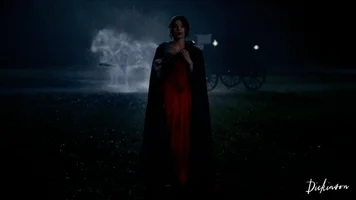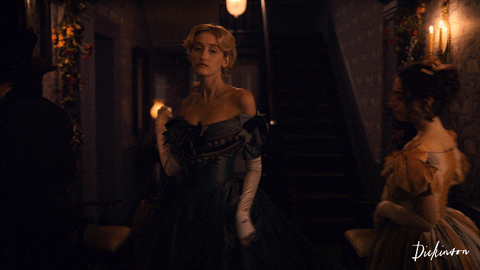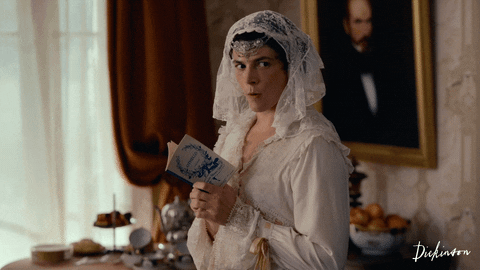Contains mild spoilers.
Also uses the word ‘weird’ a lot.
In the age of streaming services, it is hard to figure out what to watch. If you’re like me and you cannot possibly afford all the things, you may turn to the 7-to-30-day trial periods to get the shows you’re most interested in.
In the case of Apple TV+, I decided my 7-day would be spent watching the platform’s very first release, Dickinson, created by Alena Smith.
The unlikeliest candidate
A 30-minute comedy about a poet famed as a recluse hardly seems like the obvious choice a company like Apple would go for. Yet since the trailer was released it became clear it wasn’t your conventional biographical tale.
Watch the trailer:
Dissonance and Emily
Much in the way last year’s Rocketman went for metaphor to represent Elton John’s struggles, Dickinson leans into dissonance to exacerbate the way Emily Dickinson (played to perfection by Hailee Steinfeld) clashed with her time.
Instead of going for historical accuracy, the show tries to imagine how Emily’s difference would stand out. Set around the 1850s, the show dons its characters in age-appropriate attire, yet they speak like modern people, especially–and this is crucial–the teenagers. The soundtrack also clashes with the period, delivering modern pop and hip-hop beats that can cause a bit of unease at first. Added to that, Smith also incorporates elements of fantasy into it.
“As I could not stop for death, he kindly stopped for me”, reads the poem by Dickinson. And as such, a carriage does park outside Emily’s house and she climbs into it, and has a date with Death (played by Wiz Khalifa). This and other elements suggested to come from Emily’s very active imagination show up throughout the ten episodes of the show.

The overall effect, I think, is brilliant, and also–
Delightfully Weird
Emily is weird. She is ahead of her time in the way she writes and views poetry, she wants to be a man (because in those times, who wouldn’t, honestly) and she doesn’t want to get married; all of these “normal” things to be weird about when it comes to geniuses of the past.
However, she is also “weird” in other ways. She talks to herself, she is obsessed with death and wishes for her own to be liberated from what she perceives is the prison of her life. Emily collects bird’s nests and talks to herself. Her fantasies and waking dreams are real to her, and she is prone to report them to other people matter-of-factly.
“So you would have her stay here, in out house? ‘Till Kingdom come? Doing nothing?”, questions Mrs. Dickinson, played by Jane Krakowski.
“I do plenty,” replies Emily. “I’m the one who found all those birds’ nests.”
Often, biopics about people ahead of their time do a good job of having us relate to the one character who doesn’t match the times. We are left with the feeling that, should that person be alive today, they’d be respected and loved. But would they be? Emily is profoundly strange in ways that aren’t viewed kindly today.
What I find brilliant about Dickinson is that it shows us that, actually, we’d probably still other Emily Dickinson, or at least this rendition of her, in our own time. This is highlighted in the way characters speak, reminding us that though customs and politics may have changed somewhat, people really haven’t that much.

Teenagers especially act according to the times’ ideals, but their rebellions could be easily matched with those today. Smith also reminds us that people have struggled to fit in for as long as humans have existed, probably.
Weirdos Galore
In one episode, Emily decides to visit Henry David Thoreau (played by John Mulaney), whose book, Walden, she’s obsessed with.
While the episode is not about “comparing their weirdness”, per se, there is a distinct difference about how Emily’s eccentricities are treated and how Thoreau’s are viewed. Smith doesn’t make much fanfare about this, but the reading is there for the taking.
She writes Thoreau as a delusional recluse who denies reality and relishes in praise. Dickinson was known to be reclusive in her later years, and the show in a way portrays the road to her becoming more and more isolated. Thoreau’s neighbors and family talk about him fondly and laugh off his weirdness. Emily’s weirdness is seen more as something that needs to be fixed.
There are distinct exceptions. There is George (Samuel Farnsworth), her friend who is in love with her and thinks her brilliant, and her father (Toby Huss), who clearly finds her enchanting and is prone to indulge her. Then there is Sue (Ella Hunt), her best friend, who Emily is in love with and who loves her back. There are caveats in all of these relationships.
While George may love her and respect her poetry, he fails to “get” her in other ways. No matter how many times Emily tells him she doesn’t want to get married to anyone, he just won’t hear it, and presumes her mind needs to be changed.
Her father indulges her desire not to be married off. In fact he’s so attached to Emily he’d probably rather have her in his house forever. Yet he is categorically opposed to her seeking a literary career with her poetry.
And Sue… she’s had a bad hand dealt to her by life. She has to marry or else she’ll starve, and it so happens she is marrying Emily’s brother Austin (Adrian Enscoe). Emily refuses to accept this. Sue may have been a romantic at some point, but she has had a reality check and tries to get Emily to understand her predicament and let go of their old fantasy.
An acceptance of Emily is only complete when she meets a kindred spirit; someone who is weird in the same way she is. It comes in the way of Ben Newton (Matt Lauria), her father’s new assistant. Still, even he is more able to blend in with their society as he is, of course, a man.

The Weirdo in Everyone
The idea of finding someone whose weirdness fits yours is relatable because all people are strange, in one way or another.
The difference between Emily and most people is that most people are able to hide that which sets them apart from the “norm” much better. Looking at it that way, it would be safe to say that the “norm”, or the “normal”… doesn’t really exist.
Dickinson uses this idea and plays with it throughout its ten episodes.
Ever so slowly, Smith and her team of writers reveal what is different about everyone who surrounds Emily. And most everyone comes through with something that doesn’t fit the standards of their gender, age or social standing.

A brilliant case of this is Lavinia, Emily’s sister, who is possibly just as weird as the poet but wants desperately to be “normal” and sometimes tries too hard to fit in.
There is a brilliant scene where Mr. Dickinson is downstairs, and there is a ruckus and commotion up in Lavinia’s room. He reckons they’re surely talking about dresses and boys. Cut to Lavinia’s room and she and her friends are having a heated discussion about politics–specifically the abolition of slavery.
Everyone, even Mrs. Dickinson, is revealed to be a little bit weird, and even a little bit off their rocker. Those who can pretend have it easier than Emily. Then there are those who pretend because they don’t have a choice, or those who don’t get to pretend.
Checking Emily’s Privilege
With all that, it could have been very easy to portray this Emily as a victim of her time, her family and her situation. Yet there is a key point in Dickinson’s story that affects not just how she lived but how she wrote: her family was rich. Smith does not ignore this.
Emily discovers her father’s worker, Henry (Chinaza Uche), a black man, enjoys Shakespeare. She is surprised and excited and insists to the point of discomfort that he participate in her Shakespeare club. He’s reluctant, obviously, because as much as Lavinia and her friends are abolitionists, there is a distinct difference between that and thinking of people of color as their equals.
Emily: “Life shouldn’t be like this”
Henry: “What should it be like? You’re sitting here eating cakes and reading Shakespeare trying to say this isn’t what life should be like. But your life is easy, Emily Dickinson.
Henry has to hide for his own safety, he doesn’t have a choice.
Then, though there is no evidence that the real Emily Dickinson ever met contemporary Louisa May Alcott, they do encounter each other in Dickinson.
Alcott was famously poor, and she wrote to earn a living. Her books at the time, though popular, were considered “trashy” by the créme de la créme of literature: mostly rich white men who could afford to be precious and exacting about what they wrote.
Emily is portrayed as precious about her work and her form, which so differed from the canons of poetry at the time, but she didn’t have to earn a living with them. Alcott is deeply strange for the very fact that she sustains herself, and that’s not exactly something she can hide.
These don’t play out as undermining Emily’s struggles, which are very real, but they do help her have a bit of perspective on her isolated life.
This is My Emily

I feel like in a way, that is what Alena Smith’s Dickinson, and Hailee Steinfeld’s Emily is about. Eccentricity and strangeness… how she navigates it, as opposed to how others do.
The way she loves and the way people love her anyway, despite or because of it. Who feels threatened by it, and how she suffers for it. Just like Henry or Lavinia also suffer for theirs. I think it is nice to pretend the world would have been kinder to Emily, and in many ways yes, it would have. In others, not so much.
Ultimately, and as every episode closes with one of Emily Dickinson’s arresting poems, Dickinson celebrates what can come of “weird”, and reminds us how much better off we could be if we gave everyone’s differences a chance.
So, if you don’t know what do you with your 7-day trial of Apple TV+, or if you’ve needed a reason to take the plunge and subscribe, I’d highly recommend watching this unique comedy, which became my favorite television show of 2019 and is now on my computer and my phone background. No regrets.
I am afraid to own a Body—
I am afraid to own a Soul—
Profound—precarious Property—
Possession, not optional—
Emily Dickinson

